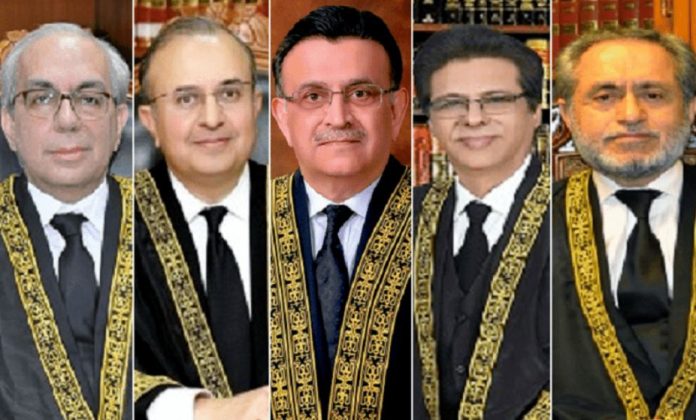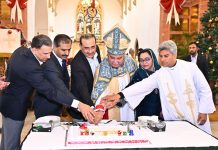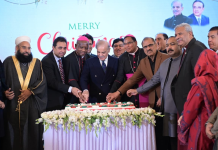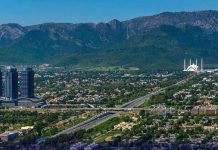ISLAMABAD, FEB 28: After the Supreme Court on Tuesday gave PTI and the coalition government until 4pm to sit together and come up with election dates in Khyber Pakhtunkhwa and Punjab — which have been under caretaker governments since the provincial assemblies were dissolved in January — PML-N’s counsel told the court that more time was needed for consultations on the matter.
Mansoor Usman Awan, who is representing the PML-N in the suo motu case, told the five-member SC bench that the PDM coalition has members from Balochistan, whereas the PML-N will also have to hold internal discussions as well as consult with the PPP.
“The court proceedings should continue as more time is needed for consultations,” he told the court.
Meanwhile, PPP lawyer Farooq H. Naek reported back that consultations were held with the PPP leadership. “The [party] leadership said that ‘giving the election date is not the job of political parties.’”
The PPP counsel said the president gave the election date without the prime minister’s advice. “The president did not even consult with the ECP. Giving the date of election without the advice was unconstitutional.”
Earlier, the court had adjourned the hearing until 4pm, with instructions for the political parties to decide on a date.
“Even if we take a decision [on the matter], the litigation will continue and this will be very costly for the public and political parties,” Chief Justice of Pakistan (CJP) Umar Ata Bandial remarked as he passed the directives to the lawyers to speak to respective party heads.
The instructions were issued after a five-member bench resumed hearing the apex court’s suo motu proceedings regarding the delay in the provincial polls.
The top judge had yesterday split a larger bench into a five-member bench to conduct the proceedings. He also indicated that they would like to conclude the matter by today.
The judges hearing the case today are CJP Bandial, Justice Shah, Justice Munib Akhtar, Justice Mandokhail, and Justice Muhammad Ali Mazhar.
Those who dissociated themselves from the hearing include Justice Ijazul Ahsan, Justice Afridi, Justice Sayyed Mazahar Ali Akbar Naqvi, and Justice Minallah.
During today’s hearing, Barrister Ali Zafar, Attorney General for Pakistan (AGP) Barrister Shehzad Ata Elahi, Supreme Court Bar Association President Abid Zuberi, JUI-F lawyer Kamran Murtaza, PPP lawyer Farooq H. Naek and President Arif Alvi’s lawyer Salman Akram Raja were present in court.
‘Democracy calls for consultation’
During the hearing, CJP Bandial stated that none of the institutions, other than the court, had the authority to extend elections further than 90 days.
“And the court can only pass these orders on concrete grounds,” he maintained, recalling that economic difficulties were also brought up during the 1988 presidential reference.
“Article 254 puts a curtain on the delay in time for elections,” the apex judge observed.
Article 254 of the Constitution states: “When any act or thing is required by the Constitution to be done within a particular period and it is not done within that period, the doing of the act or thing shall not be invalid or otherwise ineffective by reason only that it was not done within that period.”
The CJP asserted that the said provision of the Constitution didn’t give a “license to delay polls further than 90 days”, adding that the law could only be invoked during a natural calamity or war.
“If elections are not held on time, uncertainty will prevail,” he said.
CJP Bandial went on to say that the court did not have any doubts about the good intention of the government. “It is for the first time that the containers are standing but there is no foreign exchange.”
“Democracy calls for a date of elections to be decided amiably,” Justice Shah remarked, adding that the purpose of democracy lay in the act of one party displaying flexibility.
“Keep legal issues aside and think of the country. If you put Pakistan first, you will find the solution,” the judge said.
Justice Mandokhail concurred, saying that the real solution was in consultations.
The court then instructed the lawyers to consult with their respective parties about the date for elections and inform the court by 4pm.
The CJP said that the court wanted to wrap up the proceedings today. “Our entire work is on halt because of this case,” he added and adjourned the hearing.
SCBA president presents arguments
When Supreme Court Bar Association President Abid Zuberi presented his arguments, Justice Mandokhail wondered if the governors and president were bound by the advice of the cabinet in the matter. “Can they give the date for elections on their own?”
Here, the top judge observed that the governor was not bound by anyone’s advice on the appointment of the caretaker government and the date for elections.
“Where there is a discretionary authority, there is no need for advice,” Justice Mazhar also remarked.
The CJP then asked: “Who can issue the notification for the dissolution of assemblies?”
Zuberi replied that the notification of the Punjab Assembly’s dissolution was issued by the law secretary.
At that, the AGP interjected, saying that Zuberi was the petitioner’s lawyer and could not represent the bar council. However, Zuberi contended that he was a “bar lawyer and not of a political party”.
“SC had declared in the past that elections are to be held within 90 days,” Zuberi said, continuing his arguments.
Meanwhile, Justice Mandokhail maintained that under Article 48 of the Constitution, every act and action of the president was bound to be on the recommendation of the government.
“Will the current government or the previous government call for the announcement of the elections?” he asked.
“This means that the announcement of the date for elections will be on advice,” the chief justice then observed.
“But the governor has the right to dissolve the assemblies,” Zuberi argued, explaining that there were four ways of dissolving assemblies in the Constitution.
“Who will issue the notification for the dissolution of assemblies,” the CJP reiterated.
Zuberi replied that the governor had to issue the notification on the advice of the chief minister. “If the governor does not sign [on the CM’s advice], then the assembly automatically dissolves within 48 hours.”
The lawyer went on to say that in this case, the notification for the dissolution was issued by the law secretary and not the governor.
Here, Justice Akhtar said that the caretaker government is formed seven days after the dissolution. He also stated that there needed to be harmony among the different clauses of the Constitution.
Justice Mandokhail noted that the government could still ask the governor for elections today as per the Constitution.
“How can the governor refuse if advice [on the date of elections] comes from the government,” Justice Shah said.
Meanwhile, Justice Mazhar stated: “The primary question is also that the governor is saying he did not dissolve the assembly.”
Zuberi contended that the mention of the announcement of the date for elections was only in Article 105(3) of the Constitution — which states that the governor shall act on and in accordance with the advice of the chief minister.
Justice Mandokhail remarked that there was no restriction on the government regarding the announcement of the date for polls.
“But the government hasn’t announced the date for so long,” Zuberi pointed out.
Here, the CJP asked: “Are you trying to say that the government is not fulfilling its Constitutional responsibility?
“Holding elections within 90 days [of the dissolution] is in the spirit of the Constitution,” he maintained, adding that the bench will ask the AGP to assist the court on this matter.
On the other hand, Zuberi continued that if the assembly breaks under the pressure of time, then the president was supposed to give the election date. “I am of the opinion that giving the date for elections is the authority of the president of the country.”
At one point, Justice Shah asked: “Is the governor still bound to give the election date if the Election Commission of Pakistan shows the incapacity to conduct the polls.”
Zuberi replied that the governor had to give a date, irrespective of the situation.
Justice Mazhar observed that the governor had no authority not to give a date for polls but added that the governor had to give the date keeping in mind the decisions of the electoral body.
Subsequently, Justice Shah asked: “Can the president take a decision without the advice of the cabinet?”
Justice Mandokhail reiterated that the powers of the president were clear in the Constitution. “The president is bound to take advice for everything.”
Here, Zuberi objected. “The president is not obliged to seek advice. He can exercise every power that is given by law. The president and governors are only bound to consult with the ECP on the date of elections,” he stated.
However, Justice Shah stressed that the president, as the head of the state, could only take decisions on advice.
Justice Mandokhail also said that the powers of the president were not directly stated in the Constitution. “If there are no powers in the Constitution, then action will be taken under the law. And the law comes from the Constitution.”
Justice Shah asked: “Under which law is the president writing letters?”
For his part, Zuberi said that the president had sent the letters to the ECP for consultation but the judge contended that the Constitution did not talk about any dialogue.
“Let’s suppose that we believe that the law gives the president permission [to announce the date for elections] … but even then he is bound by the advice,” Justice Mandokhail observed.
“The caretaker government can also ask to give a date,” Justice Shah said.
Here, the CJP said that the court will decide whether the president needs to consult with the government after listening to arguments from the other side.












